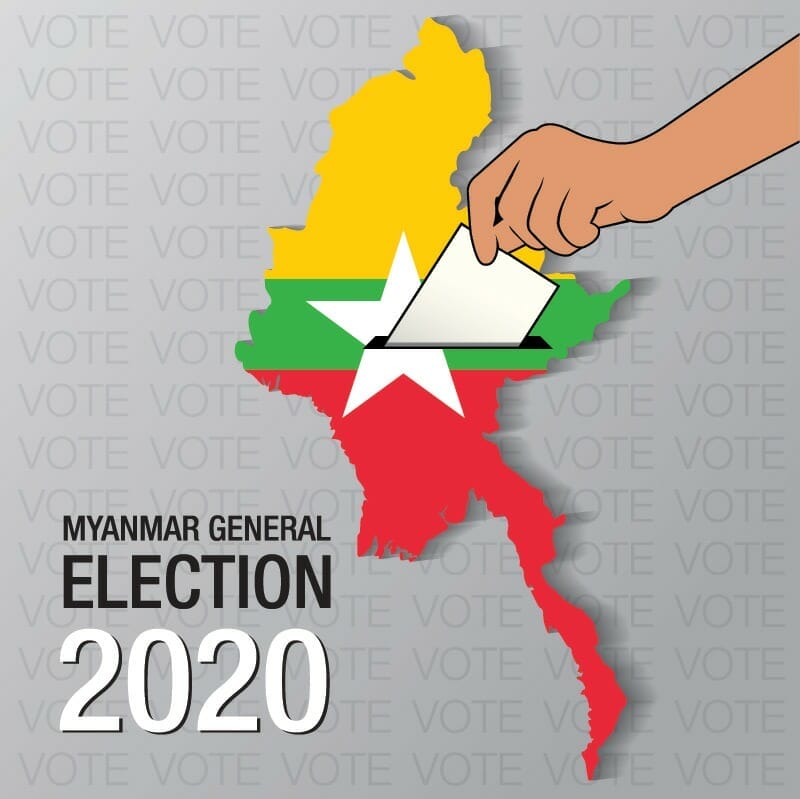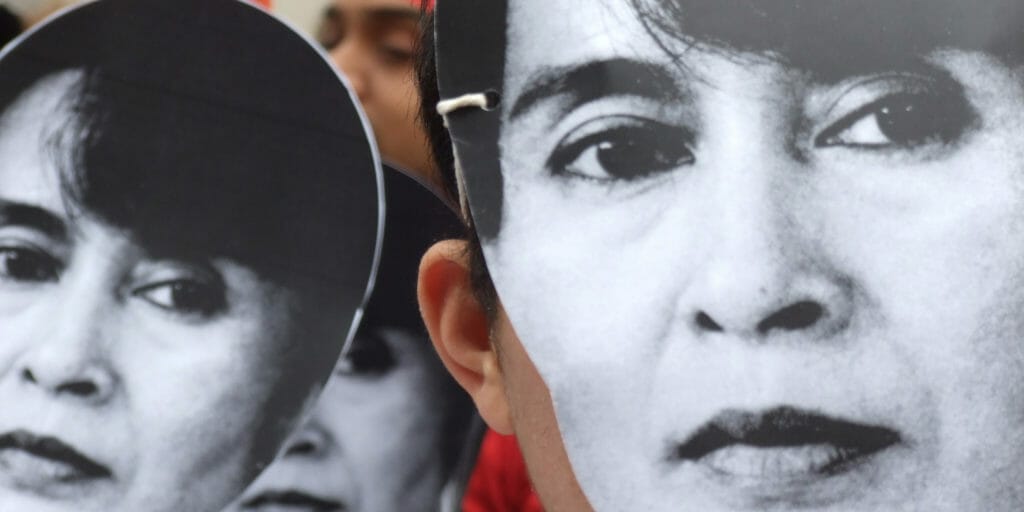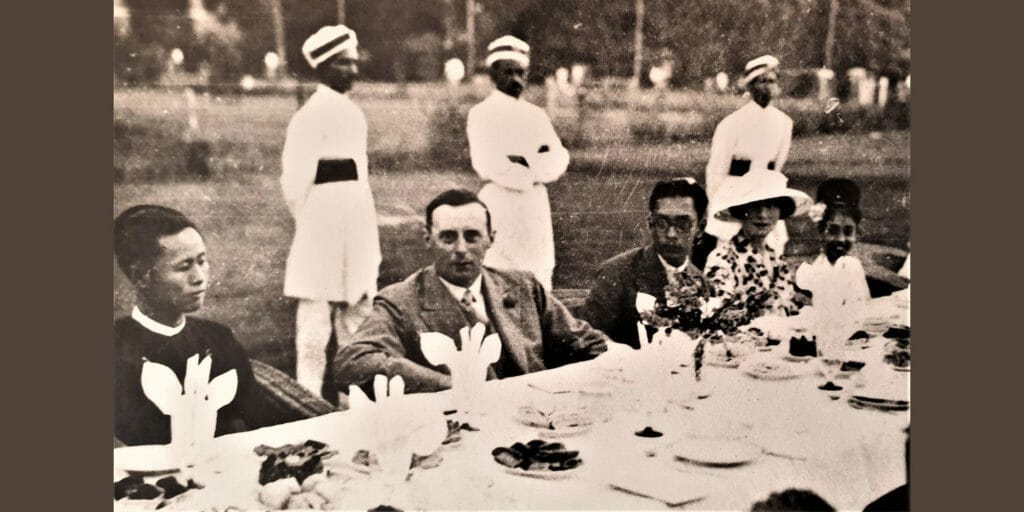Five days apart, the United States and Myanmar held elections on 3 and 8 November respectively, with record-breaking voter turn-outs.
In spite of the barrage of Trump team’s lawsuits in the battle ground states of Pennsylvania, Wisconsin, Arizona and Georgia, former US Vice President Joe Biden has been declared the indisputable victor, in both electoral college and popular votes in the US Presidential race, something that has been widely accepted by important US allies in Europe.
Eight-thousands mile away from Washington, Myanmar voters gave Aung San Suu Kyi and her NLD party a resounding re-election mandate for another ruling cycle for 5 more years.
While the outcome of Myanmar’s election is no comparison to that of the US presidential election insofar as its global ramifications, the two elections share something in common: the losers refuse to concede. In both cases, with no evidence of any appreciable fraud, Donald Trump and his Republican backers in USA and the Union Solidarity and Development Party, the Burmese military’s political proxy, challenge the outcomes.
Team Trump’s lawsuits are viewed as having no real legal reasoning nor the corroborating evidence for the assertions of the electoral frauds. On CNN News, Harvard’s Constitutional Law Professor Laurence Tribe who also served as a counsel on Al Gore vs George W. Bush case at the US Supreme Court in 2000 dismissed the suits (and their legal reasoning) as “fraudulent” and acts of “wasting money”.
In Myanmar’s case, former President Jimmy Carter’s Carter Center, an election-monitoring NGO based in Georgia, USA, issued a clear pass. The center’s 10-November-dated statement declares that “voters were able to freely express their will at the polls and choose their elected representatives…. On election day, a total of 43 Carter Center observers visited 234 polling stations in 10 states and regions. The conduct of voting was assessed positively in 94% of polling stations visited. Where counting was observed, the process was conducted according to procedures and in the presence of party agents. Tabulation of results proceeded smoothly, although access for mission observers to tabulation centers was limited or denied in three cases.”

The incumbent National League for Democracy party won a combined total of 366 seats in both houses of the national parliament: the party only needs 322 seats to retain its parliamentary control and form the second term NLD government.
The military’s proxy party USDP and the main political opposition suffered a humiliating defeat with its poor win of 21 seats in total. Smaller parties made up of ethnic minorities won the rest – 48 seats.
On 11 November, following his party’s dismal performance, Chairman of the Union Solidarity and Development Party ex-general Than Htay reportedly demanded a re-run of the entire parliamentary election, having alleged that the NLD-appointed Union Election Commission were engaged in unfair practices and ballot irregularities and tales of dead Burmese persons as registered voters, while openly soliciting the support of the country’s Armed Forces.
The party of ex-generals openly inviting the military to get involved in the country’s nascent electoral politics is deeply worrying. The parallel between the two contested electoral outcomes ends here.
Unlike the United States Armed Forces, Myanmar military has absolutely no tradition or history of serving as a professional national defence force: the US military swears allegiance to the Constitution and takes orders from the elected president as the Commander-in-Chief.
In sharp contrast, since its inception under Japan’s Fascist patronage with Suu Kyi’s father as its first commander, Myanmar military – or the Tatmadaw it is called in Burmese – has perceived itself as an armed political organization self-assigned as the ultimate guardian of the nation and the national defence force.
The primacy of the military has since independence been fast-established, owning to the long-running civil war of 70 years, with various intensities in the large swarth of the country’s underlying regions which are ancestral lands of non-dominant national minorities.

Daw Aung San Suu Kyi | Nadezda Murmakova / Shutterstock.com
So, when the current head of the military, the Commander-in-Chief, Min Aung Hlaing, issued a scathing statement directed at Ms Aung San Suu Kyi’s government lambasting the ruling civilian government as weak and incompetent, he was in keeping with the military’s self-perception of itself as the nation’s guardian.
The English language statement reads, “weakness and deficiencies which were never seen in the previous elections are appearing now. They can have adverse impacts on the image of the election.” It then goes to state that “the government has the complete responsibility for all the intentional and unintentional mistakes of the commission at its different levels.”
Such episodes of public sniping by the military certainly alarm the ethnically dominant Burmese electorate, typically resentful of the military’s constitutional primacy over the (majoritarian) democratic politics. The high voter turn-out of 70 % despite the pandemic, which voted overwhelming for Ms Suu Kyi’s party, may have been triggered by the public’s desire to stave off the blatant election meddling by the country’s military known as the Tatmadaw.
Or this may also be a sign that the view and sentiment among the largest ethnic bloc of the electorate, specifically the dominant Burmese, ABOUT AUNG SAN SUU KYI borders on the reverence of a cultist leader as opposed to a democratic politician.
By many indicators, Aung San Suu Kyi is a failed leader, for instance, in the areas of economic improvement, expansion and protection of human and civil rights, advancement of peace and ethnic reconciliation, and the fundamental reforms regarding the country’s repressive laws over the last 4 years.
And yet her popularity with the majority public remains all-time-high. Her dismal performance has not dented the wall of loyalty, enthusiasm and reverence the public have erected for her.
Beyond the attitudinal shift against the military’s direct interference in elections, votes in in Myanmar have changed little in
the country’s body politics since the Burmese military held its first-ever multiparty elections in May 1990, the results of which the generals never honoured.
This year’s elections in Myanmar have drawn widespread and sharp criticisms from various governments, international media outlets and human rights organisations for two major failures: the categorical exclusion of Rohingyas as a ethno-demographic category and the partial and full cancellations of elections in the predominantly non-Burmese regions or states on spurious grounds of “security”.
However, this criticism is misdirected: it was to be expected that no Rohingya would be allowed to either vote or contest in the election, particularly given that Myanmar’s slow genocide of Rohinya is ongoing – as the UN’s International Independent Fact-Finding Mission had officially observed in one of its influential reports.
An estimated 2 million voters in 7 ethnic minority states were denied the right to vote as the NLD-government-appointed Union Election Commission (or UEC) cancelled polls either partially or wholly in 57 townships. That is a significant number of eligible voters out of a total of 37 millions nationwide. On his part, the Commander-in-Chief blamed the Ethnic Armed Organisations in Shan, Kachin, Chin and Rakhine states where many of the cancellations took place here for the effective deprivation of the voting rights and opportunities.
As of this writing, as a clear, the military leadership has intervened directly in this year’s elections: it announced that there will be by-elections in Rakhine and Shan states where the elections have been wholly or partially cancelled by Suu Kyi’s Government-appointed Union Election Committee in certain townships on the pretext of the absence of security, arising from the military conflicts.
The military’s intervention in the country’s democratic reforms and electoral politics are systemic, not episodic or isolated incidents.
The military have constitutionally decided that only the “discipline flouring democracy” is the tailor-made democratic regime which best suits the 54 million Burmese people, and the generals are going to play the role as disciplinarians or guides. In this constitutional – and psychological – framework, the generals are granted power to stage the coup, in order to save this Discipline Flouring Democracy from chaos, instability, anarchy and armed conflicts.
Noteworthy is the fact that neither their military training nor their career experiences has prepared the military leaders for their role as the sole guide and disciplinarian of the country’s second experiment with parliamentary democracy – the first was from independence in 1948 till the coup of 1962.
In order to discharge their guiding role, the military’s Constitution – of, for and by the military – reserves 25% of the parliamentary seats in all state and national parliaments for the un-elected military officers, which are in turn organized in the pyramid command structures. These officer-MPs act as parliamentary squads, and unassailable voting blocs, obeying without fail the command from their squad commanders, who in turn receive their commands from the Commander-in-chief.
What is more? Any changes in the Constitution can only be made only with more than 75% of the votes – in the parliament where 25% of the votes are unshakably controlled by the military as the unshakable bloc of military “MPs”.
In the aforementioned ways, Myanmar’s second experiment with the parliamentary democracy is irredeemably flawed: The constitutional framework in which democratic process is located is categorically anti-democratic.
The constitutional rule with its checks and balances is, both in theory and in practice, designed to prevent any single individual or any organ of the state from having the unchallenged and unchallengeable grip over national affairs, including policy contents and decision-making.
Ms Suu Kyi has tried her very best to cajole the Burmese generals whom she calls “my father’s sons” who have “inherited” the national military which her father founded 3 years before she was born. She had waged charm offensives to win the hearts and minds of the generals while marginalizing and discarding any former party deputies, formerly jailed fellow dissidents, and human rights supporters at home and abroad. She has rejected both publicly and privately any talk of transitional justice – even the post-apartheid-style truth and reconciliation commission – in order to signal to the military that her leadership and policies will in no way pose a threat to the military, both the leadership and the rank and file members. In addition, the NLD leader knows the genocide of the Rohingya – initiated and executed by the military over several decades is the generals’ red line she cannot and is not prepared to cross. She went to the International Court of Justice – the UN’s highest court to deal with legal disputes among member states – to defend the state (with all its constitutive organs, most relevantly the armed forces).
Despite all her efforts designed to persuade the military establishment to allow her to make some of the crucial amendments (for instance, the amendment to reduce the 25% seats to 5% over 10 years), the military has only stuck to the Constitution which puts them at the unrivalled commanding position – as the sole institution above the Law and the popular will.
Five years ago, when Ms Suu Kyi and her National League for Democracy defeated the military’s Union Solidarity and Development Party in a landslide win, both the majoritarian and ethnic minority parties were jubilant. The journalists covering Myanmar elections on the ground in the country wrote about the palpable and contagious popular optimism – that the country might turn a new leaf after 50 years of life and politics in the generals’ repressive and pauperizing grip.
At the Guardian’s request, I penned the following words as part of my sobering cautionary note, or to put it crudely, served as the party pooper in the midst of national – and even worldwide euphoria. How little votes have changed since:
Having secured their ill-gotten gains – billions of dollars amassed from the proceeds of jade, natural gas and other national assets and a quarter-century of the military’s “Burmese Way to Capitalism”– and with the constitutional right to take power back 24/7, the generals will keep on smiling.
It is win-win: incremental change with echoes of the Arab spring, without bloodshed or chaos. The public and opposition get to experience another ephemeral wave of euphoria. And democratic governments in Washington, London, Paris or Canberra can now hold up Burma as a success story of the kind of business, diplomatic and military engagement they practise vis-a-vis China. Aung San Suu Kyi can feel vindicated about her Mandela-like status and her choice of a pragmatic strategy of no longer rocking the boat and fighting hard for human rights.
Never mind that the “ democracy” midwifed by these powerful actors excludes and undermines the welfare and interests of the country’s jailed student and labour activists, farmers, ethnic minorities in the civil war zones, and the disenfranchised Rohingya people and other Muslims.”
Maung Zarni
Banner: Mandalay / Myanmar – September 14 2020: Young supporters of Myanmar’s main political party (NLD). Photo: Robert Bociaga Olk Bon / Shutterstock.com



